|
|
|
Sort Order |
|
|
|
Items / Page
|
|
|
|
|
|
|
| Srl | Item |
| 1 |
ID:
169049
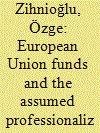

|
|
|
|
|
| Summary/Abstract |
The professionalization effect of foreign funding is one of the prominent issues in the critical literature on donor/recipient relations. Despite growing attention on this topic, the link between European Union (EU) funding to Turkish civil society organizations (CSOs) and their professionalization remain understudied. This article fills this gap. Drawing on an original set of interviews with leaders of 45 CSOs in Turkey, this article finds that EU-funded projects have not led to the professionalization of Turkish CSOs. This article suggests several reasons for this and also discusses the broader impact of EU funds in relation to CSO’s professionalization.
|
|
|
|
|
|
|
|
|
|
|
|
|
|
|
|
| 2 |
ID:
114572
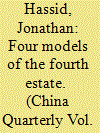

|
|
|
|
|
| Publication |
2011.
|
| Summary/Abstract |
Scholarly attention has not kept pace with the rapid changes in the professional role of Chinese journalists. Instead, two older views prevail. The first, which sees Chinese journalists as "mouthpieces" of the Communist Party unchanged from the Maoist era, downplays the tremendous changes in the media since 1978. The second view, holding that they are increasingly becoming "American-style professionals," overstates the influence of international media norms on Chinese news workers' day-to-day reality. While such communist and American-style professionals do exist in contemporary China, both are far less influential and numerous than stereotypes would suggest. Exclusive scholarly focus on these groups ignores two other more numerous and influential orientations: "advocate professionals," those who write to influence opinion and policy, and "workaday journalists," who work mainly for money and lack a commitment to public service. This article delineates all four types of Chinese journalist and explains why an understanding of the latter two professional orientations is critical to understanding China's media, politics and society.
|
|
|
|
|
|
|
|
|
|
|
|
|
|
|
|
| 3 |
ID:
104084
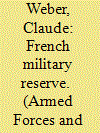

|
|
|
|
|
| Publication |
2011.
|
| Summary/Abstract |
This article reports on the current status of the system of the French military reserve. By reviewing a brief history of France's military, the author shows the existing ambivalence regarding the establishment of a permanent part-time force. In France, conscription was suspended in 1996, and a smaller professional military was created. This smaller force required a review of the needs and role of the French reserve force. Today, in France there are two reserve types: the operational and the ''citizen'' reserves. Each is examined in terms of its activities and the role, profiles, and motivations of its members. This analysis sheds light on the initial question of whether the French reserve is a real or an abstract force. The French military reserve plays not just a symbolic but also a purposive role, although essentially limited to the national territory.
|
|
|
|
|
|
|
|
|
|
|
|
|
|
|
|
| 4 |
ID:
124523
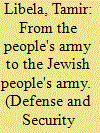

|
|
|
|
|
| Publication |
2013.
|
| Summary/Abstract |
The article discusses processes of “religionization” within the institutional identity and ethos of the Israel Defense Forces (IDF) and the connection of these processes with the significant structural changes the IDF has undergone in recent decades. The main argument presented is that since the late 1980s, the IDF has been in a culture conflict, torn between soldiers and civilians who advocate turning the IDF into a professional army “military professionalization,” and others who wish to preserve, and even strengthen, the “people's army” model. The present article shows that the meaning of the term “people” in this phrase has shifted to refer strictly to the Jewish people, and that a national-ethnic perception strongly influenced by religious-national ideology has been adopted.
|
|
|
|
|
|
|
|
|
|
|
|
|
|
|
|
| 5 |
ID:
086651


|
|
|
|
|
| Publication |
2009.
|
| Summary/Abstract |
Since the mid-twentieth century, the professionalization of our disciplines has been a hallmark of higher education in general and the research university in particular.Despite the repeated calls over the past twenty-five years for a renewal of the civic mission of higher education, professionalization continues to hold tenacious sway and is largely understood to contradict the purposes and practices of public scholarship, which, in turn, is dismissed under the demoralizing rubric of service or the paternalistic rubric of outreach.
|
|
|
|
|
|
|
|
|
|
|
|
|
|
|
|
| 6 |
ID:
193260
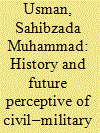

|
|
|
|
|
| Summary/Abstract |
This article examines how civil-military relations have changed in China. This is conducted in the context of long-term efforts to make the military more professional and to understand how civilians and soldiers interact today. Current analyses of Chinese civil-military relations have focused on the military's professionalization. However, the recent evaluations do not entirely include the lessons learned from past professionalization phases in the People's Liberation Army's (PLA) history. I focus on the continuity between different events in China's civil and military history by looking at the critical links that made it possible for military professionalization to change what had happened before between the Chinese Communist Party and the PLA. The potential impact of further professionalization of the PLA in contemporary civil-military interactions is also examined.
|
|
|
|
|
|
|
|
|
|
|
|
|
|
|
|
| 7 |
ID:
151965
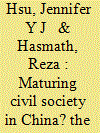

|
|
|
|
|
| Summary/Abstract |
This article suggests that Chinese NGOs do not have the conviction that they are part of an epistemic community in mainland China. Interviews conducted in four cities, Chongqing, Kunming, Nanjing and Shanghai, suggest that this can be attributed to a lack of set standards and professionalization governing their sector of operation. Further, the study finds that Chinese NGOs do not see knowledge production as their primary role within their organizational development life cycle. This may indicate a varying path towards the maturation of civil society in China, whereby Chinese NGOs do not conform to the organizational development process as outlined in extant NGO literature.
|
|
|
|
|
|
|
|
|
|
|
|
|
|
|
|
| 8 |
ID:
124530
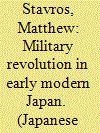

|
|
|
|
|
| Publication |
2013.
|
| Summary/Abstract |
Military changes that took place in Japan during the late sixteenth century bear a striking resemblance to those in Europe at about the same time. This essay argues that the Roberts thesis of military revolution - widely applied to Europe - provides a useful framework for identifying a series of cascading developments that, once realized, constituted the fundamental elements of a similar revolution in early modern Japan. These included: the almost universal adoption of firearms, the development of tactics for the effective deployment of those firearms, and finally, a change in the composition and organization of armies leading to the professionalization of warfare. Most important, by revolutionizing the way armies were organized and wars were fought, Oda Nobunaga and Toyotomi Hideyoshi contributed directly to the emergence of new notions of centralized authority that were critical to the creation of a unified and peaceful early modern state.
|
|
|
|
|
|
|
|
|
|
|
|
|
|
|
|
| 9 |
ID:
134373
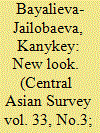

|
|
|
|
|
| Summary/Abstract |
Non-governmental organizations (NGOs) in post-Soviet Kyrgyzstan have become visible players in the social and political scene. However, despite being portrayed as professional organizations in the literature, the professionalization of NGOs in Kyrgyzstan has been understudied. This article aims to rectify this gap. It presents and discusses the findings of a study analysing NGOs from an organizational perspective using semi-structured interviews with 45 NGOs, self-administered questionnaires with their leaders and employees, and observation of their working environment. The key conclusion is that the NGO sector can be described as semi-professional. NGOs use different tactics to achieve efficiency and effectiveness. However, they face such challenges as limited funding, high staff turnover and poor coordination. The article provides an account of the NGO sector by mapping it into professional and non-professional groups that can serve as a new benchmark for better understanding NGOs in Kyrgyzstan.
|
|
|
|
|
|
|
|
|
|
|
|
|
|
|
|
| 10 |
ID:
163879
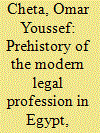

|
|
|
|
|
| Summary/Abstract |
This article examines the emergence of a new corps of legal practitioners in Egypt during the 1860s and early 1870s. The proceedings of hundreds of merchant court cases in mid-19th-century Cairo are replete with references to deputies and agents (wukalā; sing. wakīl) who represented merchant-litigants in a wide range of commercial disputes. Examining how these historical actors understood Egyptian, Ottoman, and French laws, and how they strategically deployed their knowledge in the merchant courts, this article revises the commonly accepted historical account of the founding of the legal profession in Egypt. Specifically, it argues that norms of legal practice hitherto linked to the establishment of the Mixed Courts in 1876 were already being formed and refined within the realm of commercial law as part of a more comprehensive program of legal reforms underway during the middle decades of the 19th century. In uncovering this genealogy of practice, the article reevaluates the extent to which the khedival state shared a legal culture with the Ottoman center, and, simultaneously, created the space for a new form of legal representation that became ubiquitous under British, and, subsequently, postcolonial rule.
|
|
|
|
|
|
|
|
|
|
|
|
|
|
|
|
| 11 |
ID:
146418
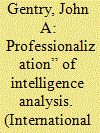

|
|
|
|
|
| Summary/Abstract |
In recent years, for the first time in the history of the U.S. Intelligence Community (IC), a debate among scholars and some practitioners has arisen about whether intelligence analysis is, or can be, a “profession”—and by what standards analytic professionalism should be defined and judged. The dominant academic view seems to be that analysis should be, but is not, a profession, defined in ways similar to those of such recognized professions as medicine and law. More recently, a version of such thinking has emerged in the Department of Defense (DoD), with the Office of the Undersecretary of Defense for Intelligence (USD(I)) mandating the development of certification and accreditation standards for personnel who perform all intelligence-related job categories in all military and civilian elements of the DoD, which the department calls the Defense Intelligence Enterprise (DIE).
|
|
|
|
|
|
|
|
|
|
|
|
|
|
|
|
| 12 |
ID:
151579
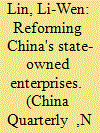

|
|
|
|
|
| Summary/Abstract |
The Chinese Communist Party has recently unveiled its new agenda for state-owned enterprise (SOE) reform. Most attention to date has focused on structural reform through the so-called “mixed ownership” policy. This article is to direct attention to a critically important yet much less analysed item on the SOE reform agenda: the professionalization of the SOE executive personnel. This article provides an empirical study on the managerial elite of China's financial and non-financial SOEs. The findings suggest a politically constrained management approach in the Chinese state-owned sector. Moreover, an innovative analysis of the SOE executive career patterns reveals that the state-controlled banks and industrial SOEs employ divergent human resource management methods. The anatomy of the SOE managerial elite in this article provides a timely evaluation of the recent SOE reform policy and a richer understanding of China's state-owned sector from a comparative capitalism perspective.
|
|
|
|
|
|
|
|
|
|
|
|
|
|
|
|
| 13 |
ID:
140205
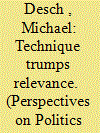

|
|
|
|
|
| Summary/Abstract |
I explain here the disconnect between our discipline's self-image as balancing rigor with relevance with the reality of how we actually conduct our scholarship most of the time. To do so, I account for variation in social scientists' willingness to engage in policy-relevant scholarship over time. My theory is that social science, at least as it has been practiced in the United States since the early twentieth century, has tried to balance two impulses: To be a rigorous science and a relevant social enterprise. The problem is that there are sometimes tensions between these two objectives. First, historically the most useful policy-relevant social science work in the area of national security affairs has been interdisciplinary in nature, and this cuts against the increasingly rigid disciplinary siloes in the modern academy. Second, as sociologist Thomas Gieryn puts it, there is “in science, an unyielding tension between basic and applied research, and between the empirical and theoretical aspects of inquiry.” During wartime, the tensions between these two impulses have been generally muted, especially among those disciplines of direct relevance to the war effort; in peacetime, they reemerge and there are a variety of powerful institutional incentives within academe to resolve them in favor of a narrow definition of rigor that excludes relevance. My objective is to document how these trends in political science are marginalizing the sub-field of security studies, which has historically sought both scholarly rigor and real-world relevance.
|
|
|
|
|
|
|
|
|
|
|
|
|
|
|
|
|
|
|
|
|